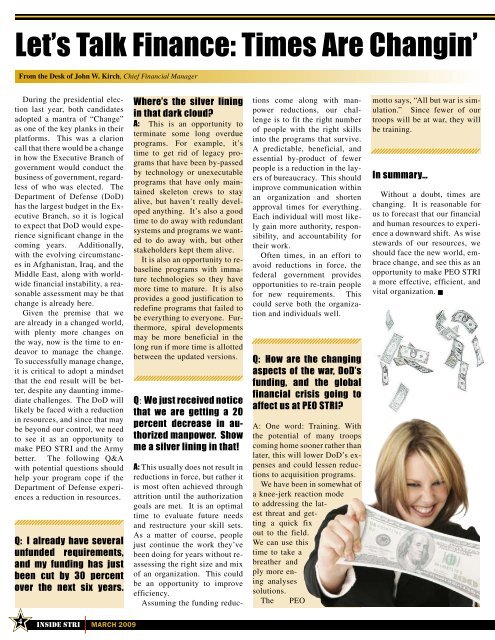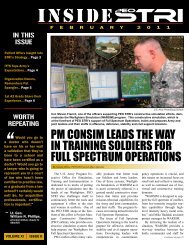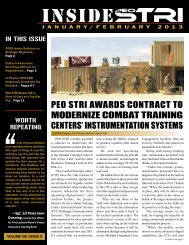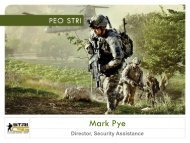inside - PEO STRI - U.S. Army
inside - PEO STRI - U.S. Army
inside - PEO STRI - U.S. Army
You also want an ePaper? Increase the reach of your titles
YUMPU automatically turns print PDFs into web optimized ePapers that Google loves.
Let’s Talk Finance: Times Are Changin’<br />
From the Desk of John W. Kirch, Chief Financial Manager<br />
During the presidential election<br />
last year, both candidates<br />
adopted a mantra of “Change”<br />
as one of the key planks in their<br />
platforms. This was a clarion<br />
call that there would be a change<br />
in how the Executive Branch of<br />
government would conduct the<br />
business of government, regardless<br />
of who was elected. The<br />
Department of Defense (DoD)<br />
has the largest budget in the Executive<br />
Branch, so it is logical<br />
to expect that DoD would experience<br />
significant change in the<br />
coming years. Additionally,<br />
with the evolving circumstances<br />
in Afghanistan, Iraq, and the<br />
Middle East, along with worldwide<br />
financial instability, a reasonable<br />
assessment may be that<br />
change is already here.<br />
Given the premise that we<br />
are already in a changed world,<br />
with plenty more changes on<br />
the way, now is the time to endeavor<br />
to manage the change.<br />
To successfully manage change,<br />
it is critical to adopt a mindset<br />
that the end result will be better,<br />
despite any daunting immediate<br />
challenges. The DoD will<br />
likely be faced with a reduction<br />
in resources, and since that may<br />
be beyond our control, we need<br />
to see it as an opportunity to<br />
make <strong>PEO</strong> <strong>STRI</strong> and the <strong>Army</strong><br />
better. The following Q&A<br />
with potential questions should<br />
help your program cope if the<br />
Department of Defense experiences<br />
a reduction in resources.<br />
Q: I already have several<br />
unfunded requirements,<br />
and my funding has just<br />
been cut by 30 percent<br />
over the next six years.<br />
Where’s the silver lining<br />
in that dark cloud?<br />
A: This is an opportunity to<br />
terminate some long overdue<br />
programs. For example, it’s<br />
time to get rid of legacy programs<br />
that have been by-passed<br />
by technology or unexecutable<br />
programs that have only maintained<br />
skeleton crews to stay<br />
alive, but haven’t really developed<br />
anything. It’s also a good<br />
time to do away with redundant<br />
systems and programs we wanted<br />
to do away with, but other<br />
stakeholders kept them alive.<br />
It is also an opportunity to rebaseline<br />
programs with immature<br />
technologies so they have<br />
more time to mature. It is also<br />
provides a good justification to<br />
redefine programs that failed to<br />
be everything to everyone. Furthermore,<br />
spiral developments<br />
may be more beneficial in the<br />
long run if more time is allotted<br />
between the updated versions.<br />
Q: We just received notice<br />
that we are getting a 20<br />
percent decrease in authorized<br />
manpower. Show<br />
me a silver lining in that!<br />
tions come along with manpower<br />
reductions, our challenge<br />
is to fit the right number<br />
of people with the right skills<br />
into the programs that survive.<br />
A predictable, beneficial, and<br />
essential by-product of fewer<br />
people is a reduction in the layers<br />
of bureaucracy. This should<br />
improve communication within<br />
an organization and shorten<br />
approval times for everything.<br />
Each individual will most likely<br />
gain more authority, responsibility,<br />
and accountability for<br />
their work.<br />
Often times, in an effort to<br />
avoid reductions in force, the<br />
federal government provides<br />
opportunities to re-train people<br />
for new requirements. This<br />
could serve both the organization<br />
and individuals well.<br />
Q: How are the changing<br />
aspects of the war, DoD’s<br />
funding, and the global<br />
financial crisis going to<br />
affect us at <strong>PEO</strong> <strong>STRI</strong>?<br />
A: One word: Training. With<br />
the potential of many troops<br />
coming home sooner rather than<br />
later, this will lower DoD’s expenses<br />
and could lessen reductions<br />
to acquisition programs.<br />
We have been in somewhat of<br />
a knee-jerk reaction mode<br />
to addressing the latest<br />
threat and getting<br />
a quick fix<br />
out to the field.<br />
We can use this<br />
time to take a<br />
breather and<br />
apply<br />
more en-<br />
during<br />
analyses<br />
a n d<br />
solutions.<br />
The <strong>PEO</strong> S T R I<br />
A: This usually does not result in<br />
reductions in force, but rather it<br />
is most often achieved through<br />
attrition until the authorization<br />
goals are met. It is an optimal<br />
time to evaluate future needs<br />
and restructure your skill sets.<br />
As a matter of course, people<br />
just continue the work they’ve<br />
been doing for years without reassessing<br />
the right size and mix<br />
of an organization. This could<br />
be an opportunity to improve<br />
efficiency.<br />
Assuming the funding reducmotto<br />
says, “All but war is simulation.”<br />
Since fewer of our<br />
troops will be at war, they will<br />
be training.<br />
In summary…<br />
Without a doubt, times are<br />
changing. It is reasonable for<br />
us to forecast that our financial<br />
and human resources to experience<br />
a downward shift. As wise<br />
stewards of our resources, we<br />
should face the new world, embrace<br />
change, and see this as an<br />
opportunity to make <strong>PEO</strong> <strong>STRI</strong><br />
a more effective, efficient, and<br />
vital organization. <br />
4<br />
Inside <strong>STRI</strong> MARCH 2009

















